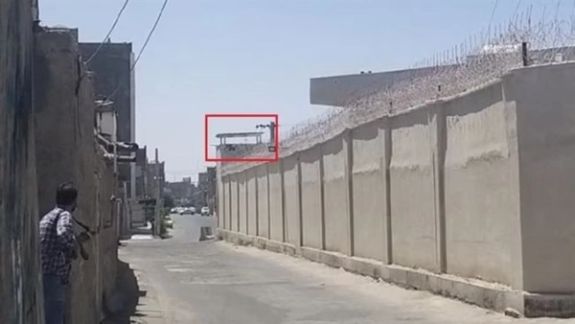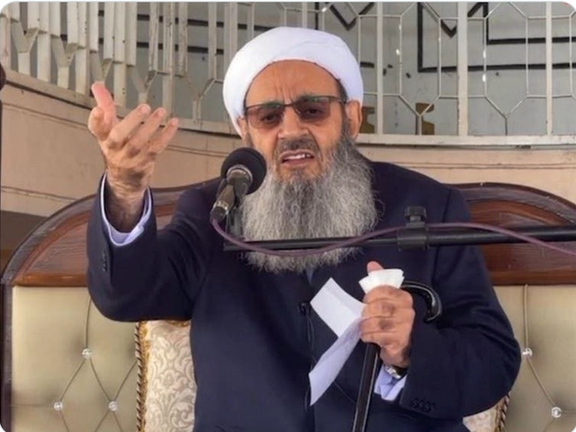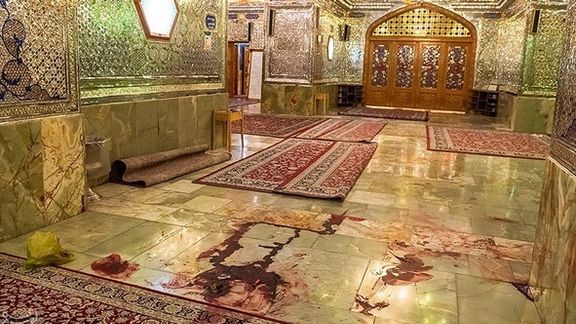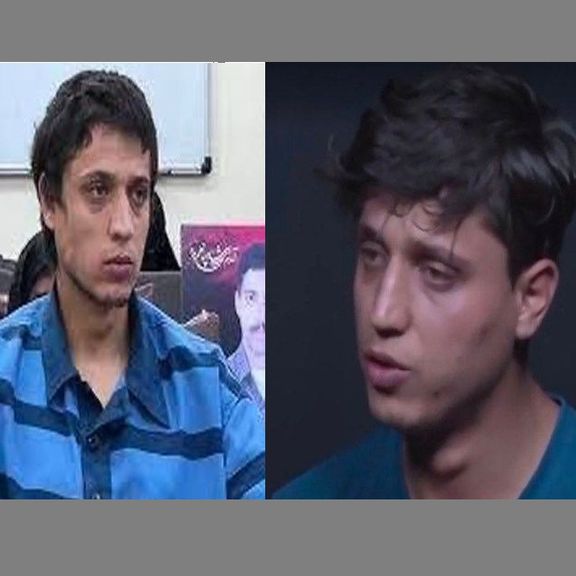Iranian Kurdish Political Prisoner 'Killed Under Torture'

Kurdish human rights organizations say a political prisoner from Piranshahr in Iran’s West Azarbaijan province has been killed after being tortured while in detention.

Kurdish human rights organizations say a political prisoner from Piranshahr in Iran’s West Azarbaijan province has been killed after being tortured while in detention.
Hengaw and Kurdistan Human Rights Network reported on Sunday that intelligence organizations refused to hand over the body of Mousa Esmaili to his family to hold a funeral ceremony.
According to these reports, after 62 days of detention, officials of the Urmia intelligence department called Ismaili's family and "without any explanation" asked them to come and receive the body of their son, but they refused to hand over the body later.
Esmaili, 35, from the village of Pasavi, was arrested on May 7 while the agents confiscated his car as well.
According to Hengaw, a source close to Ismaili's family said, "without any explanation or providing evidence of any judicial process and trial the security officers only said that Mousa was executed.”
Based on the report, Ismaili has not appeared in any court, and it is not even clear what were the charges against him. His family also insists that he was killed under duress.
The security and intelligence have also threatened the family that talking about the issue and publicizing it will have serious consequences for them.
Hengaw added that Esmaili had no contact with his family since his arrest, and during this time, the family's follow-ups with police and courts remained unanswered.
Iranian intelligence and security agencies often bring unsubstantiated charges against dissidents, who are then tried behind closed doors without a lawyer. Several have died in unclear circumstances and torture.

Nazila Maaroufian, a journalist and student at Allameh Tabatabai University in Tehran, was arrested on Saturday following a summons to the Prosecutor's Office at Evin prison.
Her arrest occurred after security agents from the intelligence ministry raided her home last week and ordered her to appear at the prosecutor's office.
In a tweet, she shared the details of the government agents' invasion of her home to conduct a search and confiscate her personal belongings. She emphasized that despite Iranian citizens being deprived of safety even within their own homes, they should persevere and not surrender.
Maaroufian was previously employed by the moderate Iranian news website Rouydad 24, which had been a reliable source of news about developments in Iran.
However, in March, the Iranian regime blocked access to the website after it published an interview with Amjad Amini, the father of Mahsa (Zina) Amini.
Mahsa Amini, a Kurdish Iranian woman, died in the custody of the "hijab police," sparking the current wave of anti-regime protests, which are the largest the Islamic Republic has faced since its establishment in 1979.
Nazila Maroufian and Marzieh Amiri, journalists from the outlet, were imprisoned due to the interview and their reports on the protests.
After 72 days of detention, Maroufian was temporarily released from Gharchak Varamin prison on a bail of six billion rials. However, she was later sentenced to two years in prison on charges of "propaganda and publication of lies."

The Iranian Writers Association is urging people and organizations around the world to support the Iranian protesters by becoming their voice and advocating for their rights.
In a statement issued on Saturday, the association condemned the crackdown on street protesters, the wave of arrests, instances of torture and intimidation, and the imposition and execution of death sentences by the Iranian government. They further noted the ongoing oppression faced by women in various forms and the discriminatory working and educational environments for those who protest the compulsory hijab.
The association emphasized the importance of collective action in overcoming the challenges imposed by the government and called for a unified effort to address the issues faced by the Iranian people.
Earlier this week, a UN-mandated fact-finding mission made a plea to Iran to halt the execution of individuals sentenced to death for their involvement in the country's past anti-government protests. The mission urged Iranian authorities to provide access to judicial files, evidence, and judgments related to these individuals.
According to the fact-finding mission's report, the claim by Iranian authorities that 20,000 arrested protesters have been pardoned suggests that the actual number of detainees surpasses this figure. The report also highlighted the shocking execution of seven protesters and expressed concern over reports of coerced confessions obtained through torture.
The Iranian Writers Association's call for global support aims to shed light on the plight of Iranian protesters and detainees, seeking justice and an end to the ongoing violations of human rights in Iran.

An attack on a police station in Zahedan, a Sunni-majority city in Iran, claimed the life of two policemen, amidst lack of clarity about the incident.
According to Iranian law enforcement officials in Sistan-Baluchistan province, four gunmen attacked the police station using hand grenades and seized control of a watchtower. The attack was still ongoing as of noon local time. In early afternoon, officials said that all four gunmen were eventually killed and the situation around the heavily protected police compound returned to normal.
These circumstances suggest that since the attack began at around 7:15 am, it took hours to subdue the gunmen. This raises questions about whether the details provided by the authorities accurately represented the event.
Other reports have mentioned one or two suicide bombers detonating explosives to create an entry point for others into the heavily guarded premises. However, police officials insist that there were no suicide bombings and only hand grenades were used.
Tensions in Zahedan have been high since security forces, under the command of the Revolutionary Guard, killed an estimated 80-90 civilian protesters in the city on September 30, 2022, marking the start of anti-regime nationwide protests in Iran. This tragic event became known as Black Friday.

Since then, the people of Zahedan have been participating in peaceful demonstrations every Friday after prayers and sermons by their respected religious leader, Mowlana Abdolhamid.
One hour after the attack began, Abdolhamid disassociated himself from the incident and called for peace and security. However, some speculate that the authorities can use the incident to restrict his freedom, possible putting him under house arrest.
The authorities have attempted to intimidate and silence Abdolhamid, who has strongly criticized the rulers of the Islamic Republic in his sermons. He has called for a referendum on the future of the country, respect for women, the release of political prisoners, and genuine elections.
The government has failed to launch a proper investigation into the mass killings that occurred during Black Friday, which has been one of Abdolhamid's demands. No security officials have been arrested or suspended.
Some reports suggested that the police station - precinct #16 - was the compound from where security forces opened fire on September 30, 2022, because it was close to the main mosque where people began their protest march.
Although incidents of attacks against security forces have occurred in the impoverished and desolate province for years, the general population has remained peaceful. On June 30, Zahedan residents held a silent march in the city.
In this instance, no one knows who the attackers are and it cannot be ruled out that the whole incident could have been staged by security and intelligence organs to clamp down on Zahedan's residents and particularly Abdolhamid.
In recent weeks, the regime has escalated pressure on the outspoken cleric by arresting several individuals from his inner circle and supporters. Additionally, Abdolhamid has been prevented from leaving Iran for the annual Hajj pilgrimage in Saudi Arabia.
In June, his grandson and several aides were arrested. The Makki Mosque, Abdolhamid's headquarters in Zahedan, has become a center of resistance against the government since September 2022. It is where Abdolhamid delivers his weekly sermons, openly criticizing Supreme Leader Ali Khamenei's regime.
These arrests followed reports that the Revolutionary Guard's intelligence arm had assigned a hitman to poison and kill the prominent Sunni cleric. Security guards at Makki Mosque apprehended a man posing as a religious student who allegedly intended to assassinate the Sunni leader.
Last updated at 16:00 GMT, July 8

Iran hanged two Afghan men in public on Saturday who were accused of playing a role in an attack on a shrine in October where 15 people died and 20 were wounded.
Mohammad Ramez Rashidi and Naeem Hashem Ghetali were hanged in a street near the Shahcheragh Shiite shrine and mausoleum in the southern city of Shiraz early in the morning. Iran's official news agency IRNA said they were hanged before dawn with “hundreds of the families of the martyrs” and other citizens of Shiraz witnessing the executions.
The attack on Shahcheragh shrine took place October 26 last year when anti-regime protests were raging on in Iran. This led to speculations and accusations that the attack was staged by the government to divert attention from the protests and also justify a crackdown.
However, in a strange twist, the Islamic State group took responsibility for the attack, which fit the government narrative of Iran being under attack by extremists.

The lone gunman, who entered the shrine with an assault rifle, was shot and wounded during the attack and the government said he died later in the hospital and identified him as a citizen of Tajikistan. The two men who were hanged July 8 were accused of playing a direct role in the "arming, procurement, logistics, and guidance of the main perpetrator" of the terrorist attack.
Iranian human rights groups have said that the trial of the two men was not held according to legal standards and their conviction and subsequent death penalties were illegal.
Mahmood Amiry-Moghaddam, director of Norway-based Iran Human Rights, said Thursday that the two Afghan nationals were sentenced to death after “grossly unfair trials where no evidence was presented against them.”
Documents released by a hactivist group in early December showed that the Revolutionary Guard might have has foreknowledge of the attack and did nothing to stop it.
The documents, released by hacking group Black Reward, were several reports prepared by the IRGC’s media arm, Fars news agency, which were marked “top secret” and indicated that the author believed at least parts of Iran's several intelligence organizations had knowledge of an imminent terrorist attack but did not take any action to stop it.
Many Iranians immediately after the attack began accusing the regime of organizing the terror act as some kind of distraction from the boldest and most widespread protests in 43 years of clerical rule. Some even alleged that the government of complicity with ISIS in the attack to create its own narrative and martyrs to divert attention from fierce anti-regime protests.
CCTV footage shown on state TV showed the gunman entering the popular shrine despite the usual heavy security measures with a weapon and firing at worshippers as they tried to flee and hide in corridors.
The attacker, identified as Sobhan Komrooni with the nickname “Abu Aisha”, a citizen of Tajikistan, later died in a hospital from injuries sustained during the attack, according to the government.
Iran's intelligence ministry in a statement in November claimed that a citizen of the Republic of Azerbaijan who was the “main element of directing and coordinating the attack” had flown from Baku and entered Iran through Tehran’s Imam Khomeini Airport. According to the statement, he had then contacted the ISIS network of foreign nationals in Iran and organized the attack.
Some people at the time also noted a similarity with a 1994 terrorist attack on the shrine of Imam Reza in Mashhad which killed and injured dozens of people. Although a Sunni group had claimed responsibility, the government laid the blame on the People’s Mujahedin Organization of Iran (MEK). However, the former Interior Minister Abdollah Nouri claimed during his trial in 1999 that it was a false flag operation by the Iranian regime to discredit MEK.

Iranian rap artist Saman Seydi, better known as Saman Yasin, has been "severely tortured" in prison, Iran International has learned.
Seydi was arrested in October 2022 during the anti-regime protests in Iran, and was handed a death sentence. However, his appeal against the sentence was accepted in December, and now he is expecting a retrial.
"During the interrogations, Saman was severely tortured to confess he was carrying weapons (when arrested). They threatened to arrest members of his family should he refuse to make the confession they demand," a source close to Seydi's family told Iran International.
The source said Saman had been "suspended in the air" in prison for three days so that he would be forced into confession.
Saman Yasin's retrial was supposed to be held on May 8, 2023. However, he has been left in limbo in Rajaeishahr Prison, west of Tehran, awaiting his court session without access to a lawyer.
The 25-year-old dissident rapper from the Kurdish-majority Kermanshah province in Western Iran, reportedly attempted suicide in prison by taking a large number of pills back in December.
While the Islamic Republic's Judiciary accepted the appeal against Saman Yasin's death sentence, he still faces the charge of acting against the country's national security and "waging war against God", which is punishable by capital punishment.